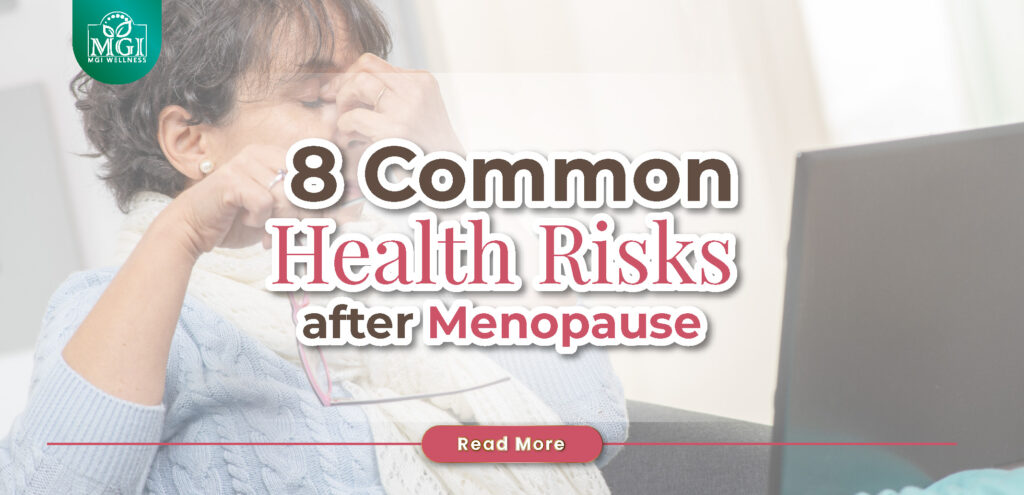Wellness
8 Common Health Problems After Menopause
Menopause begins one year after a woman has her last menstruation and usually happens after the age of 45. Due to the fluctuation of the estrogen hormone, a number of physical and psychological symptoms can occur, which varies from person to person. The most common symptoms are hot flashes, night sweats, vaginal dryness, fatigue, sleep problems, and mood swings. Besides these problems, there are other health risks which may occur after menopause. Here are 8 common health risks that women may face after menopause:
- Heart disease
After menopause, women tend to have a higher risk of developing heart diseases. The deficiency of estrogen hormone during menopause can lead to higher homocysteine levels, which is one of the main risk factors of heart diseases. (1,2) Besides that, this can also affect the elasticity of the blood vessels, increase cholesterol levels, and thus, increasing the risk of heart diseases. (3)
- Stroke
Likewise, the risk of stroke increases too due to elevated homocysteine and poor blood vessel elasticity. Besides that, other stroke risk factors such as high blood cholesterol, blood sugar and fat accumulation in the abdomen region (abdominal obesity) are also more prevalent after menopause, and thus, increasing the risk of stroke. (3,4)
- Weight gain
Weight gain is also another common occurrence after menopause. As the estrogen hormone drops after menopause, changes in body fat distribution and body composition occur, causing an increase in body fat especially at the abdomen region. Being overweight increases the risk of chronic diseases such as heart disease and diabetes. (3,5)
- Diabetes
Being overweight affects the body’s response to the insulin hormone, and causes insulin resistance, which means that the body cannot use and store glucose effectively. This causes high blood sugar levels as glucose accumulates in the blood. Besides that, changes to the female hormones especially estrogen levels can also cause fluctuations in blood sugar. (1,6)
- Osteoporosis
The lack of estrogen hormone after menopause causes bone loss and thus, increasing the risk of osteoporosis. (7) Osteoporosis is a bone disease that causes the bones to be brittle and weak.
- Urinary Tract Infection (UTI)
Urinary tract infections are common amongst women especially after menopause. The estrogen hormone helps keep the vagina moist and encourages the growth of good bacteria. As the estrogen hormone drops after menopause, changes to the vagina occurs,which affects the growth of the good bacteria. This causes bad bacteria to grow and thus, increasing the risk of cross infection to the urinary tract. (8,9)
- Urinary incontinence
Low estrogen hormone also changes the bladder and urinary mechanism, causing frequent urination or uncontrollable leakage of urine. (8,9)
- Depression
Menopause increases the risk of mood disorders, especially depression, due to the changes in hormones. Menopausal symptoms such as hot flashes and sleeping problems may further aggravate symptoms of depression. (1)
References
- van Dijk G, Kavousi M, Troup J, Franco O. Health issues for menopausal women: The top 11 conditions have common solutions. Maturitas. 2015;81(1):151.
- Gambacciani M, Mannella P. Homocysteine, menopause and cardiovascular disease. Menopause International. 2007;13(1):23-26.
- Lisabeth L, Bushnell C. Menopause and Stroke: An Epidemiologic Review. Lancet Neurol. 2012;11(1):82-91.
- Zhao M, Wang X, He M, Qin X, Tang G, Huo Y et al. Homocysteine and Stroke Risk. Stroke. 2017;48(5):1183-1190.
- Changes in Weight and Fat Distribution, Sexual Side Effects of Menopause | The North American Menopause Society, NAMS [Internet]. Menopause.org. [cited 7 October 2022]. Available from: https://www.menopause.org/for-women/sexual-health-menopause-online/changes-at-midlife/changes-in-weight-and-fat-distribution
- Watts M. Managing diabetes whilst going through menopause can feel like a twin challenge for most women due to the combined effects that each condition can have on the body. [Internet]. Diabetes. [cited 7 October 2022]. Available from: https://www.diabetes.co.uk/menopause-and-diabetes.html
- Menopause and osteoporosis [Internet]. Betterhealth.vic.gov.au. [cited 7 October 2022]. Available from: https://www.betterhealth.vic.gov.au/health/conditionsandtreatments/menopause-and-osteoporosis
- Jin J. Vaginal and Urinary Symptoms of Menopause. JAMA. 2017;317(13):1388.
- Robinson D, Toozs-Hobson P, Cardozo L. The effect of hormones on the lower urinary tract. Menopause International. 2013;19(4):155-162.


Great post!
I do not even know the way I finished up here, however I believed this submit used to be good. I don’t recognize who you are but definitely you’re going to a famous blogger when you aren’t already 😉 Cheers!
Excellent read, I just passed this onto a colleague who was doing some research on that. And he just bought me lunch because I found it for him smile So let me rephrase that: Thank you for lunch!
I would like to show some thanks to this writer just for bailing me out of this type of challenge. Because of surfing throughout the internet and meeting suggestions which are not powerful, I figured my entire life was gone. Existing devoid of the strategies to the issues you’ve solved as a result of this posting is a serious case, and the kind that could have adversely damaged my career if I had not encountered your website. Your own mastery and kindness in playing with almost everything was excellent. I don’t know what I would’ve done if I had not come across such a thing like this. I can also at this moment relish my future. Thanks for your time very much for this expert and results-oriented guide. I will not hesitate to endorse your web page to any person who will need recommendations about this topic.